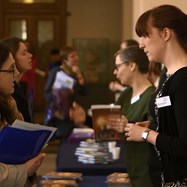Russell Group welcomes Sutton Trust report on scientists' backgrounds
08 October 2009
Responding to the Sutton Trust’s report on The Educational Backgrounds of Leading Scientists and Scholars, Dr Wendy Piatt, Director General of the Russell Group, said:
“We welcome this useful contribution to the continuing debate about widening access to higher education. We would endorse the report’s emphasis on the need for good advice to pupils when it comes picking suitable subjects at A-level and would urge schools to encourage young people to apply to leading universities.
With 83% of current members of the Royal Society, Russell Group universities are well placed to be the nurseries for future top scientists and scholars and it is vital that bright students from all backgrounds are encouraged to aspire to this kind of inspirational research-led teaching. We cannot offer places to students who do not apply.
“Russell Group universities have undertaken a raft of initiatives to help raise attainment and aspirations by working closely with local schools, colleges and community organisations, organising summer schools, and providing access courses. They spent £45 million of additional fee income on outreach and bursaries last year (2007/08).”
Notes to editors
There is a notable disparity in uptake of science and maths between state and independent schools:
- Fewer than one in 10 students take one+ science A level in mainstream and science specialist schools compared with roughly one in three at grammar and independent schools.
- Roughly 80% of physics teachers in independent schools had a degree in physics, compared to only 30% of those in state schools. Almost one in four secondary schools in England no longer has any specialist physics teacher.
- 35% of further maths entries are in independent schools.
- Studies by Anna Vignoles and Peter Dolton have found that "individuals who have mathematics A Level earn between 7% and 11% more than otherwise similar individuals who do not take mathematics beyond the age of 16.
-
Hamir Patel
hamir.patel@russellgroup.ac.uk
020 3816 1316
-
Hollie Chandler
Hollie.Chandler@russellgroup.ac.uk
020 3816 1307
 X
X


